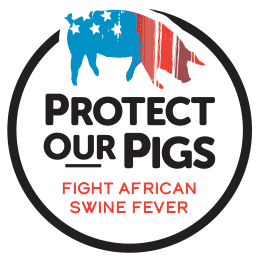Iowa Secretary of Agriculture Mike Naig is encouraging pork producers to take part in the U.S. Department of Agriculture Animal and Plant Health Inspection Service’s African Swine Fever Action Week, to be held Sept. 13 to 17.
The USDA APHIS and Iowa Department of Agriculture and Land Stewardship will hold educational webinars to help raise awareness about ASF, a viral disease that affects commercial, backyard, show and wild pig populations.
ASF is not considered a human health or food safety risk but it has devastated pig populations, pork producers, commodity markets and international trade as it spread through other parts of the world. ASF has not been detected in the United States but the disease is active in the Dominican Republic.
“The detection of ASF in the Dominican Republic is very concerning and should be a wake-up call for all of us. We must remain vigilant to keep ASF out of the U.S. The geographic border is our first line of defense against foreign animal diseases and on-farm biosecurity is our last,” said Secretary Naig. “Now is the time to take action. I encourage all pork producers to evaluate their biosecurity protocols and on-farm disease response plans and look for opportunities to strengthen them.”
The USDA APHIS will hold daily webinars to emphasize the importance of foreign animal disease preparedness, the ongoing, preventative efforts to keep the disease out of the U.S., and what pork producers can do to protect their herds. The details and links to register for the USDA APHIS webinars are available at aphis.usda.gov.
Protecting your herd
The Iowa Department of Agriculture and Land Stewardship reminds pork producers that practicing good biosecurity on their farms every day is the best way to keep animals healthy.
All pork producers should:
• Evaluate opportunities to strengthen the biosecurity practices on their farms.
• Register for a Premises ID and make sure the contact information, including a phone number and email address, is up to date.
• Restrict visitors to their farms.
• Avoid contact with livestock for five days after traveling abroad to prevent the potential spread of diseases.
• Isolate new animals or exhibition animals that travel to a show, from the rest of the herd until they can confirm that the animals are illness-free.
• Work with their herd veterinarian to monitor the health of their animals. Some of the clinical signs of foreign animal diseases overlap with endemic diseases that are already found in the U.S., including erysipelas, salmonella and PRRS.
• If pigs have a high fever, decreased appetite, weakness, red, blotchy skin or skin lesions, diarrhea, vomiting, coughing or difficulty breathing, contact a veterinarian and state or federal animal health officials immediately.
More information about the USDA APHIS ASF Action Week is available at aphis.usda.gov.




